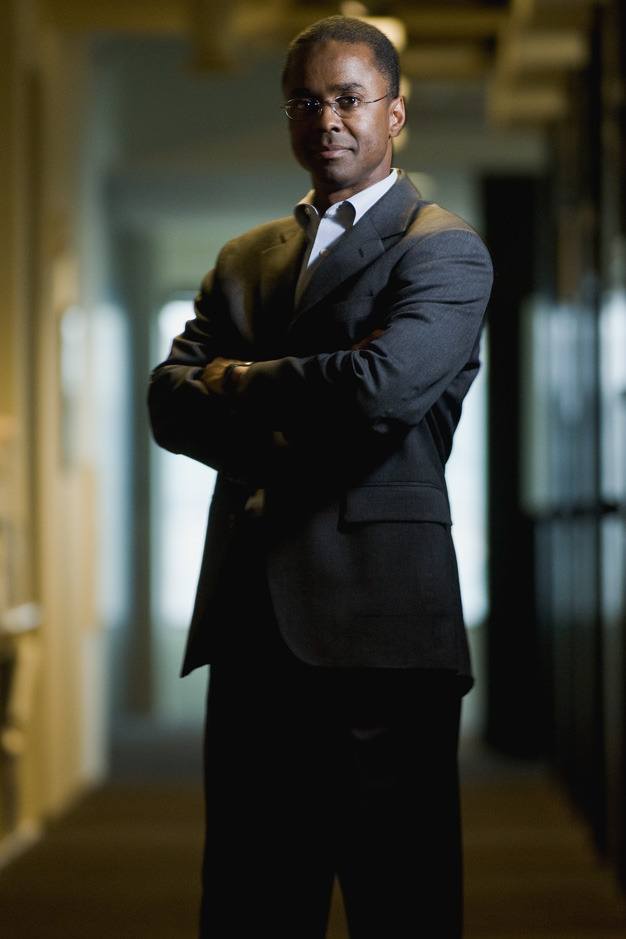Islander and attorney Richard Mitchell will challenge King County Council incumbent Jane Hague for Position 6 in the general election this November. Position 6 represents most of Bellevue north of I-90, Medina, Clyde Hill and Mercer Island. Seattle Port Commissioner John Creighton has also filed to run for the nonpartisan seat on the council.
Mitchell, 44, is an attorney with the Summit Law Group of Seattle, where he leads the real estate asset group — a multi-disciplinary practice involving real estate, land use, environmental, design and construction law. He lives on Mercer Island with his wife, Dawn, and three young boys who all attend Lakeridge Elementary School. For four years, he was the General Counsel for Governor Chris Gregoire. He holds a law degree from Syracuse University.
He is involved with myriad public service organizations that include the Legal Foundation of Washington, the King County Housing Authority, Seattle University Board of Regents, and the King County Bar Association.
In 2009, as a relatively young attorney, he was the recipient of the State Bar Association’s Professionalism Award.
But this is where Mitchell’s similarities to many prominent attorneys in Western Washington ends. For it is his journey to these points that sets Mitchell apart.
Mitchell was born in London to parents who immigrated to England from Guyana and the West Indies as teenagers. He lived there with his family until he was 12, when the family came to the eastern United States. As he completed middle school in the U.S. and struggled to erase his English accent and fit in, a counselor took him aside and asked him if he would consider applying for a scholarship to attend an elite boarding school in Maryland. And he did.
After high school, his studies were not directed toward law, but instead were aimed at architecture.
He attended Cornell University, where he was referred to Professor Henry Louis Gates, Jr., the director of the African American Affairs Program at the university and a well-known American literary critic, educator and scholar.
Gates, who he calls “Skip,” became a valued mentor and friend, one of many who helped Mitchell define his life goals.
In a profile of the attorney on the King County Bar Association’s Web site, Mitchell said that Gates helped him to understand the relationship of culture to his studies of architecture. “It helped me focus my subsequent disparate academic and professional experience into a focused intellectual endeavor, into a purposeful sense of community obligation.”
After graduating from Cornell with honors, he continued his architecture studies at the University of Michigan’s College of Architecture and Planning, where he earned a Master of Urban Planning degree.
Along the way, he was given the opportunity to apply his urban planning skills as a part of a small group working on a master plan for the massive London Docklands re-development project in East London in 1989-1990.
It was ironic, he said, because the London Docklands were similar to the London neighborhood where he grew up and where his father still lives nearby. Those formative years, he said, were part of how he came to consider a calling in housing and development.
The complexity of the Docklands project helped focus what he felt he needed to do next.
“I realized that if my understanding of architecture and urban redevelopment were going to mature, I would need to learn more about finance and law.”
After he completed a law degree at Syracuse University, he came to the Seattle area in 1995. In 2004, he moved to Mercer Island with his young family and in 2005 was tapped to work in the governor’s office.
His experience in the governor’s office was intense, he said, covering a wide range of issues with tight deadlines. It was his first exposure to politics, he said. It was then that he began thinking in terms of a political life for himself.
In his spare office above Pioneer Square, facing the buildings and cranes of the Port of Seattle, Mitchell has several colorful prints on his wall. They are drawings by children illustrating the many faces of social justice. The drawings each offer a different slice of what diversity means. On another wall is a well-known Norman Rockwell print, with the inscription, “Do unto others…”
That is my motto, he said.
He has been watching what might happen in the race for Jane Hague’s seat — he was stunned that no one had yet come forward to challenge her.
“She has a lot of support and has been on the council for many years,” he acknowledged.
Mitchell filed his paperwork with the state public disclosure commission on Jan. 17. He presently has a total of $3,715 listed with the PDC. According to the Seattle PI, a fundraiser for Hague at the Bellevue home of author J.A. Jance last year raised more than $40,000.
Hague was first elected to the council in 1993. She ran unopposed in 1997, 2001 and 2005. In the midst of her campaign for re-election in 2007, she was arrested and charged with drunken driving. Despite the publicity, she won the election.
Mitchell’s priorities for the work ahead for the council are framed around three areas: transportation, housing and public health and safety. Yet he notes that the first order of business is resetting the priorities, given the state of the economy and its impact on public funding.
“Now that state funding for many things is gone, it becomes up to us, in our county, to reset the priorities of government,” he said.
But Mitchell notes that it is not just up to him to decide. He said that as he begins his campaign, his first task is to see what the priorities are of the constituents of the sixth district.
“The first order of business is a listening tour,” he said. “I know what my priorities might be — but I need to know what citizens want.”


